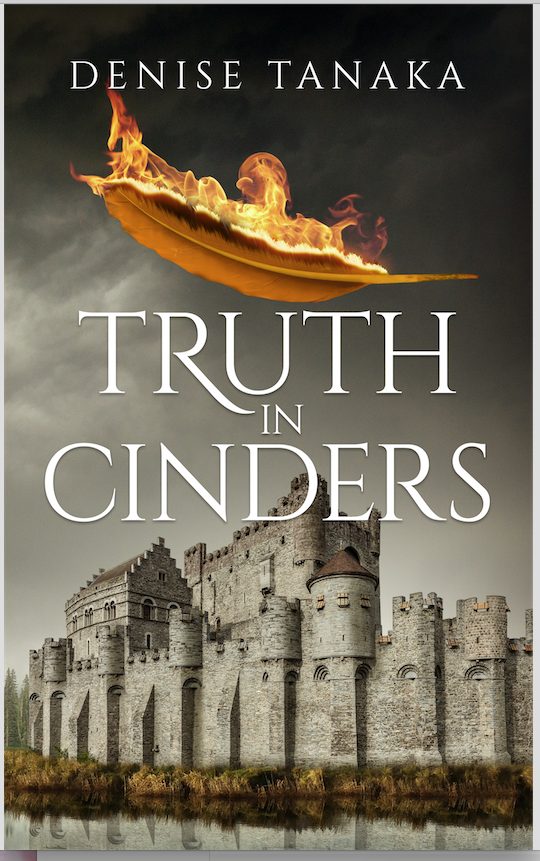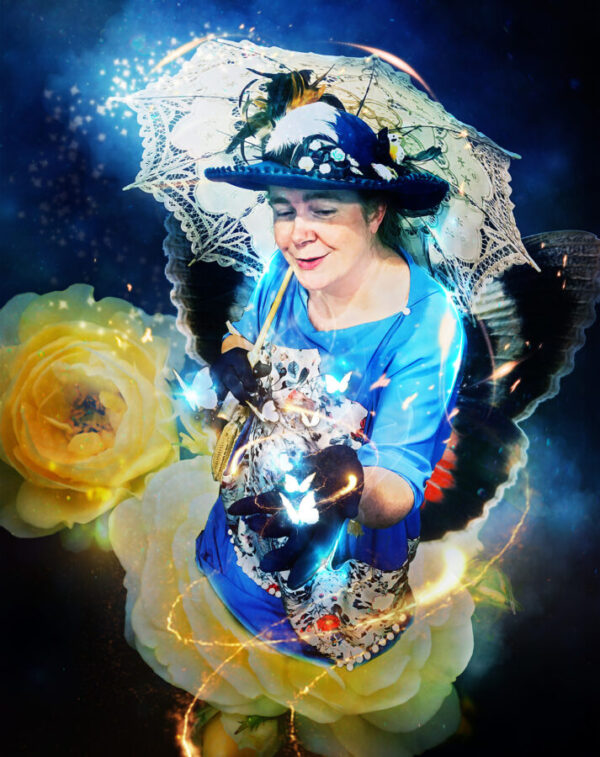Welcome to my weekly Author Spotlight. I’ve asked a bunch of my author friends to answer a set of interview questions, and to share their latest work.
Today: Denise B. Tanaka has a lifelong passion for writing stories of magical beings and faraway worlds. Her father inspired a love of art with his landscape paintings, portraits, and photography. Her mother inspired a love of books by reading aloud The Gingerbread Man and Mrs. Tittlemouse, so from a very young age Denise believed that cookies run away and mice can talk. She is sometimes sidetracked by nonfiction biography and true crime projects. A graduate of Sonoma State University, she pays the bills by working as a paralegal in immigration law. She has dabbled in genealogy for more than 35 years and is very grateful for the internet.
Thanks so much, Denise, for joining me!
J. Scott Coatsworth: What do you do when you get writer’s block?
Deniste Tanaka: I recharge my mental battery by reading a good book or writing something like fanfic just for fun.
JSC: If you could tell your younger writing self anything, what would it be?
DBRT: Don’t hold yourself back. Don’t hesitate to pursue your dreams or put it off until you feel ready. The moment is now!
JSC: What do you do if you get a brilliant idea at a bad time?
DBRT: I always carry a notebook and a pen. Stoplights are meant for jotting down quick thoughts!
JSC: How long have you been writing?
DBRT: When I was 12, I wrote a female version of Tarzan and drew the cover art in crayon.
JSC: Are you a full-time or part-time writer? How does that affect your writing?
DBRT: I work a demanding full-time “day job” as an immigration paralegal. Pro: the legal helped to develop my logical plotting brain. Con: I have less time to work on my fiction projects.
JSC: Are you a plotter or a pantser?
DBRT: A little of both. My outlines are more of a synopsis. It’s like going on a road trip. There’s a map and a general idea of where we’re going, but you never know what stops will happen along the way.
JSC: How do you approach covers for your indie stories?
DBRT: When I hire a graphic designer, I am “hands off” as much as possible. I collaborate and offer ideas, but I’m a writer not a visual artist. I let a pro do their thing.
JSC: Tell me one thing hardly anyone knows about you.
DBRT: I have a tuning fork in my head called perfect pitch or absolute pitch. It means that tones are stored in the language/memory area of my brain, unlike how a majority of people experience music. I can name any musical note as easily as a spoken A-B-C. Fun party game! Test my X-Men mutant power!
JSC: What other artistic pursuits (it any) do you indulge in apart from writing?
DBRT: I’ve done a lot of costuming at Ren Faire, Dickens Fair, cosplay-masquerade, Halloween, etc.
JSC: What are you working on now, and what’s coming out next? Tell us about it!
DBRT: I have several projects in the works. One, I’ve just started drafting a space opera. Two, I’m rewriting the final book in my epic fantasy trilogy. And, coming out next year is a standalone epic fantasy titled “The Blighted Touch” – in a cursed land where merely touching causes unbearable pain, one woman embarks on a quest to find the cure.

And now for Denise’s latest book: Truth in Cinders:
Condrie the tavern maid befriends a man on the run only to discover he is a firebird disguised in human form. Together they must elude the tyrant king’s relentless forces while seeking the truth of who massacred other firebirds enslaved to the king.
Amazon | Universal Buy Link
Excerpt
“Help me!” huffed a hoarse male voice. A man thrust his head and half his body in through the open window.
Condrie dropped the bellows that she had been using to revive the kitchen’s fire for supper. Wooden handles clattered on the stone floor.
The man glanced backward at the town’s streets behind him. Evening made the shadows dim. Insects continued droning their summer song undisturbed. He appeared to calm down one notch from total panic.
Surprisingly nimble for a man so tall, he tucked up his long legs to roll over the windowsill. He slammed the shutters and dropped the bolt to seal them. Though he moved quickly, she caught the twinkle of jeweled buttons in a blur of elegant colors. Never had she seen such intense purple, indigo, clover, and scarlet except in a field of wild flowers. A gentleman . . . on this side of town?
Crouching alongside her at the hearth, he looked up with vivid blue eyes. “Help me, girl. They want to kill me.”
Coin-pinchers are getting more bold and violent these days. Condrie flapped her hand to draw him toward the center of the room.
The gentleman helped her slide the heavy table aside. She plucked up an iron ring in the floor’s hatch. He didn’t balk at the dark pit. He didn’t hesitate to plunge blindly into the root cellar with the barley stalks, juniper berries, cardamom pods, and radishes. Enough of a glow came from the smoldering fireplace to see the top of his head. Shaggy, pale hair was like fronds of wheat crouching among the bitter vegetables.
Condrie let the hatch fall. The table was too heavy to drag back into place by herself, so she adjusted the stools and then dropped a sack full of lemons over the hatch’s iron ring.
Someone knocked on the back door.
Condrie swallowed her heart back down into her chest.
“Open in the name of King Davarche of Xol,” demanded an angry voice. Several others muttered outside.
She frowned to wonder why agents of the kingdom to the south had ventured so far from their domain. Briefly she wished for the courage to shout at them, Go away, your hornets! You have no business here!
Condrie slid aside the plank that bolted the door.
Knights of Xol entered the kitchen—tall, muscled beings clothed in the dark wool of foreign rams. Metallic chips were riveted to the shoulder pads of their coats and the bracers on their forearms. Crescent gorgets hung over their chests. Their heavy boots pounded on the hard floor. Seven of them—seven soldiers and seven swords—entered to poke around. One stayed outside to watch the street.
One beardless knight spoke in a strong, clear voice. “We’re looking for a gentleman. Have you seen or heard someone of quality run by?”
A woman! In the identical stiff uniform as the others, and with the mannerisms of a cavalryman, Condrie had not recognized this knight’s sex until she spoke.
Condrie shook her head to answer. She continued gawking, not only because a woman bore arms in service of the southern king, but she had the exotic look of a foreigner. She had wide-set pale eyes, a blunt nose, caramel-toned skin, and auburn hair that she had chopped short to the collar like the other knights.
“Is your mother at home, girl?”
My mother is dead. I’m an orphan. I just work in the kitchen here. Too many words, too much explanation clogged up at the back of her tongue. Again, she shook her head to answer.
The woman knight stepped in closer to stare down at Condrie’s upraised eyes. “Are you a mute?”
“N-n-n-n-no . . . I-I-I-I. . . .” She balled her fists, silently cursing her stubborn tongue. Of all the times for it to fail! Why could the words never make the journey smoothly from her mind to her mouth? Especially at a time like this. They’ll think I’m nervous; they’ll think I’m hiding something.
The other knights checked the window shutter, seeing it was bolted from inside. They poked their leather gloves into barrels of flour and pickles, knocked the skillets and pans at their hooks, and even picked through the stack of logs by the smoldering hearth. One of them took a ripe peach from the basket and gnawed into its sweetness. Put that down! It doesn’t belong to you! Yet she did not dare to scold him.
“Do you have a husband?”
Condrie shook her head. “N-n-n-no husband.”
“Surely you don’t live alone in this grand house? You look too young to be the mistress, so where is your master?”
Condrie’s tongue gagged in the back of her throat. She wanted to cry out, Don’t you know where you are? Didn’t you see the sign on the street?
“Answer me, wench,” the woman knight snapped.
The knight from outside put one foot in the door. “Captain? There’s a placard over the door. This isn’t a home, it’s a brewery.”
“No, we’re a dis-. . . dis-. . .” Condrie stammered and gritted her teeth. The correct word, distillery—such a simple word—refused to come out of her mouth.
“A brewery?” The woman knight snickered to her companions. “We’re wasting time here. He must have gone the other way.”
With a rattle of scabbards, the seven of them filed out the door. The vacant kitchen suddenly seemed enormous when she was alone.
Condrie carefully bolted the door shut. She pressed her ear to a gap in the planks and listened to the whistle of outside air. She waited until she was sure that their heavy boots had tromped the cobblestones farther down the street.
When she raised the heavy trap door, her arms trembled. She wasn’t sure if it was from nervousness or the exertion.
“Are they gone?” the man whispered from deep down in the hole.
Condrie nodded.
After a hesitation, he slowly emerged from the root cellar. Condrie’s eyes opened wide as she took her first long study of him. He was a tall foreign man, as the knights were, but slender so he didn’t seem overwhelmingly large. Coppery blond hair extended past his shoulders in the flamboyant fashion of lords in the southern kingdom. He had recently shaved; only a day’s worth of stubble made a fuzz at his chin. Such clothes! He dressed better than any land baron she knew. The velvets were as soft as a brushed cat. Buttons made a row of jewels down his jerkin’s breast line. Brass buckles die-cast as bulls’ horns clipped his cape together. His belt was narrow, and he carried no weapons. His boots were soft-soled suede not meant for traveling.
The man slouched wearily as he sat by the hearth bricks. Condrie expected that his rush of fear would take some time to drain away.
Condrie asked, “Have you done something terrible, sir?”
“I have offended my king.” He had a deep, melodic voice like a singer talking. A cultured, foreign accent gave a sense of importance to even the simplest of words. “My departure from court was, shall I say, disruptive.”

